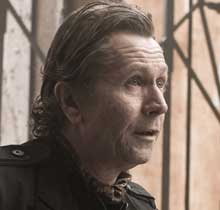The Book of Eli is a decent post-apocalypse film largely devoid of the ‘destroyed landmarks’ porn that often affects this genre, feeling more like an Eastwood-era western set in the world of Fallout 3, with heavy overtones of Walter Miller’s A Canticle for Leibowitz and suggestions of Bradbury’s Fahrenheit 451.
 The bulk of Eli takes place in and around an unnamed town, ruled over by the tyrannical leader Carnegie (Gary Oldman, as himself), that offers us one of the few glimpses of post-apocalypse civilisation — naturally it involves a lot of violence, guns and the amusing bartering of pre-collapse commodities such as bottles of shampoo and lemon hand-wipes for precious water. These are staples of post-apocalyptic fiction — what was once common and of no value becomes highly-valued and rare — but such staples are hard to avoid and at least help us to understand how radically life has changed for the survivors.
The bulk of Eli takes place in and around an unnamed town, ruled over by the tyrannical leader Carnegie (Gary Oldman, as himself), that offers us one of the few glimpses of post-apocalypse civilisation — naturally it involves a lot of violence, guns and the amusing bartering of pre-collapse commodities such as bottles of shampoo and lemon hand-wipes for precious water. These are staples of post-apocalyptic fiction — what was once common and of no value becomes highly-valued and rare — but such staples are hard to avoid and at least help us to understand how radically life has changed for the survivors.
At any rate, this world looks the part; instead of the ash-choked land of The Road, The Hughes brothers give us a sun-drenched world, bleached and parched, where even the blind wear sunglasses. I’m not criticising The Road in this respect — a world suffocating under nuclear fallout is as plausible as any other destroyed land — but the world of Eli fits more with our current, real world apocalypse predictions — that of a cooked Earth, rather than a cold one.
Denzel Washington is Eli. He walks the land, protecting the last known copy of the Bible with his implausible yet entertaining ninja skills, trying to take it somewhere west. He tells people that he’s been charged by a voice to deliver the book somewhere and we’re not given any reason to believe that he isn’t on a bona fide Mission From God — his ability to take on large gangs of heavily-armed men without breaking a sweat and escape from locked and guarded rooms is never rationally explained so we have to believe that he’s essentially blessed with divine protection. Fair enough, I suppose.
 Mila Kunis’ character is unrealistically beautiful, but then so is Mila Kunis so while I’m happy to let that slide, it’s still a little distracting when in this dry, dead world she walks around looking as if she’s preparing for a desert photo shoot.
Mila Kunis’ character is unrealistically beautiful, but then so is Mila Kunis so while I’m happy to let that slide, it’s still a little distracting when in this dry, dead world she walks around looking as if she’s preparing for a desert photo shoot.
Generally the film delivers a satisfying blend of action and pondering. Where Eli falls down is in its idea that the salvation of the post-apocalyptic world can be found in the cultural detritus of the previous civilisation; this isn’t an idea I’m comfortable with. The notion that if, after the End Times, we can just get everyone reading Hamlet and listening to The Magic Flute then civilisation will attend to itself is just simplistic, arrogant and paternalistic – i.e., it wasn’t the culture that was at fault, just the people.
The idea that it’s the Bible itself that will help kick-start civilisation again also sticks in the throat if you’re not a decent, church-going American, particularly as the notion that the Bible may have been the cause of the apocalypse is mentioned. This idea is never explored beyond Carnegie’s insistence that the book isn’t just a book but a weapon; Eli himself never dwells on it — he wouldn’t, he reads it every day without fail — but it’s an interesting idea that could have been fleshed out some more. This idea forms the crux of Leibowitz but Miller also takes that idea to its logical conclusion — restoring the previous culture just ends up bringing humanity back to another apocalypse.
All that to one side; I also need to mention that nobody blows up a truck quite like the Hughes brothers, and that Frances de la Tour and Michael Gambon make a couple of charming cannibal cameos.